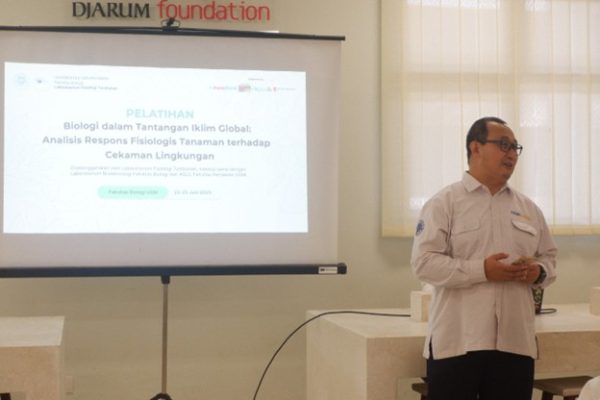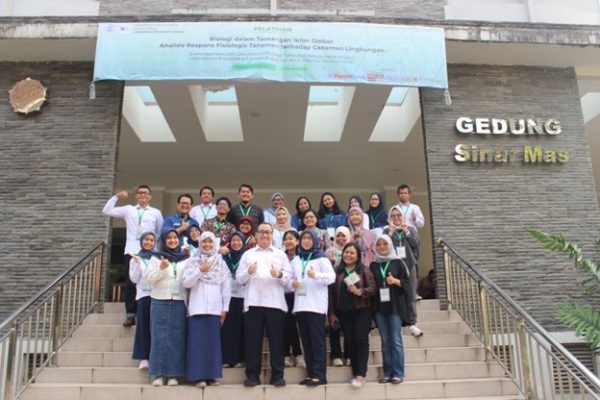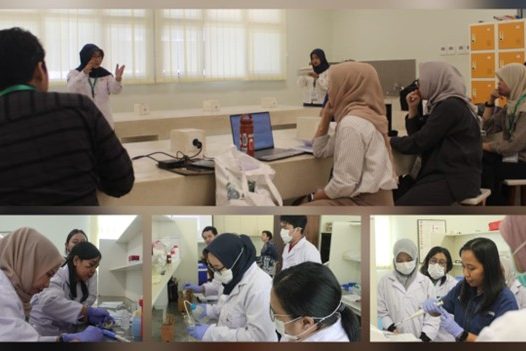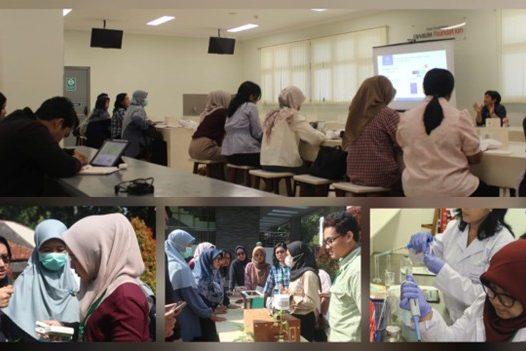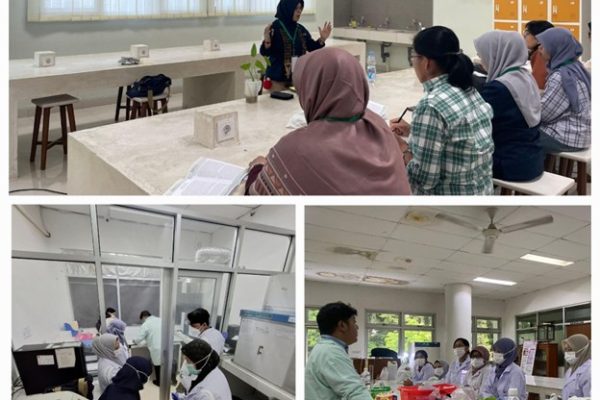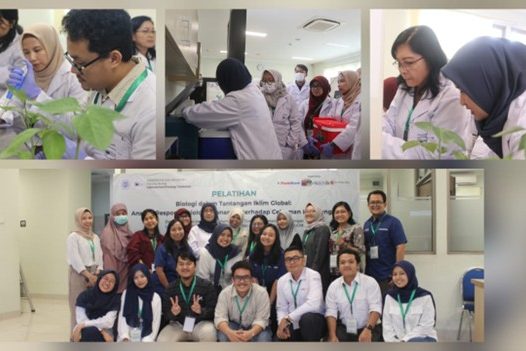The Plant Physiology Laboratory organized a three-day training on plant physiological responses to environmental stresses, held from Monday (June 23, 2025) to Wednesday (June 25, 2025). This activity was conducted in collaboration with the Biotechnology Laboratory of the Faculty of Biology, Universitas Gadjah Mada (UGM), and the Agrotropica Learning Center (AGLC) of the Faculty of Agriculture UGM. The training utilized various facilities available at UGM as part of the university’s commitment to fulfilling the Tri Dharma of Higher Education, particularly in the areas of education and community service. The event began with an opening speech by the Head of the Plant Physiology Laboratory, Prof. Dr. Diah Rachmawati, S.Si., M.Si., who emphasized that current environmental changes pose a real challenge to the sustainability of plant life, particularly in the agricultural sector and food security. “Understanding how plants respond to environmental stresses is becoming increasingly essential,” she added. The formal opening of the event was delivered by the Vice Dean for Research, Community Service, Collaboration, and Alumni Affairs, Dr. Eko Agus Suyono, M.App.Sc. He highlighted that this training represents an excellent example of inter-laboratory collaboration, and emphasized that despite the rapid advancement of Artificial Intelligence (AI), “human talk” and hands-on training to enrich personal skills will never be fully replaced. “Through this training, participants are not only expected to gain scientific knowledge, but also to use this opportunity as a platform to build collaborative networks,” he remarked. He also added that the facilities available at the Faculty of Biology are open and accessible for broader utilization.
The opening ceremony was also attended by the Head of the Biotechnology Laboratory, Wahyu Aristyaning Putri, S.Si., M.Sc., Ph.D., as well as representatives from sponsoring organizations, including Yayasan Satriabudi Dharma Setia (YSDS) and Panin Bank, PT Widya Life Science, PT Kairos Jaya Sejahtera, PT ITS Science Indonesia, and PT Ditek Jaya. The training was joined by both academics and professionals from various institutions, including Universitas Sriwijaya, Universitas Negeri Jakarta, UIN Sunan Kalijaga, Universitas Ahmad Dahlan, UKWMS Kampus Madiun, Universitas Kristen Artha Wacana, the Faculty of Animal Science UGM, Global Prestasi School Bandung, and PT. IMP 168.
On the first day, the topic of plant physiological responses to environmental stress was presented by Prof. Diah followed by practical analysis of Membrane Stability Index (ISM), Reactive Oxygen Species (H2O2), Malondialdehyde (MDA), and enzymatic antioxidants (Superoxide Dismutase/SOD and Catalase/CAT). The preliminary presentation related to the analysis practice was delivered by Dr. Siti Nurbaiti, S.Si. and Sidiq Permana Putra, S.Si., M.Sc. In addition to conventional methods, analysis was also carried out using a kit with a microplate reader which is supported by PT. Kairos Jaya Sejahtera.
The second day of the training featured a session by Prof. Dr. Kumala Dewi, M.Sc.St., focusing on photosynthesis. Utilizing the LICOR instrument provided by the AGLC, Faculty of Agriculture, Universitas Gadjah Mada (UGM), participants were able to obtain comprehensive analyses of photosynthetic parameters. Additionally, chlorophyll measurements were conducted using a SPAD meter and through acetone extraction methods. Proline content was also measured during the second day of training. On the final day, content related to phytoremediation was delivered by Dr. Dwi Umi Siswanti, S.Si., M.Sc. Participants were introduced to heavy metal analysis, particularly mercury, using the Atomic Absorption Spectrophotometer (AAS) available at the Biotechnology Laboratory. The analysis process was also supported by PT Ditek Jaya. Each day’s practical session was followed by a discussion and analysis of the results obtained, allowing participants to develop a more in-depth understanding. In addition to laboratory staff members Martono, S.T. and Asri Fajar Milasari, S.Si., the training was also supported by students (Ph.D. and undergraduate), namely Hana Widiawati, Hanif Fauzan Saputra, Maharani Pratiwi Salsabila A., Muhammad Reza Hendriansah, Rima Vegi Santika, and Adzkiya Aqmaliza Rahmatillah.
Moving forward, similar training programs are expected to be held regularly and sustainably, with increasingly diverse topics and strengthened cross-sector collaborations. This initiative also aligns with efforts to achieve several Sustainable Development Goals (SDGs), including Quality Education (Goal 4), Climate Action (Goal 13), and Partnerships for the Goals (Goal 17).

